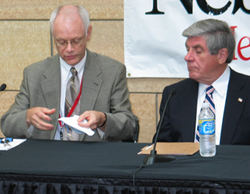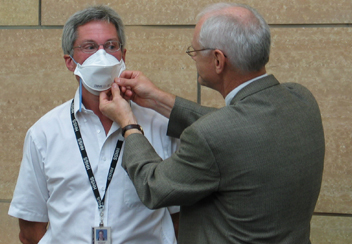 |
Steven Hinrichs, M.D., professor and director of the University of Nebraska Center for Biosecurity and professor of pathology and microbiology at UNMC, displays a 3M “N95” mask as U.S. Sen. Ben Nelson looks on Monday. Thanks in part to federal funding Nelson helped secure, UNMC researchers will look to develop a respirator mask that could prevent the spread of diseases such as avian influenza. |
The collaboration received a boost Friday when UNMC was appropriated $5.4 million in federal funds for research. About $1.8 million of that appropriation was designated to develop personal protection gear, such as the respirator, that defend against infectious agents.
“The life-saving research being done right here in Omaha helps contribute to Nebraska’s growing reputation as the ‘Silicon Prairie,'” said Nelson, who played a key role in securing the funding.
Nelson was joined at a news conference at UNMC on Monday by Steven Hinrichs, M.D., professor and director of the University of Nebraska Center for Biosecurity and professor of pathology and microbiology at UNMC, and Dave Werner, plant manager at the 3M facility in Valley, Neb.
UNMC and 3M’s goal is to create a respirator, which will resemble a surgical mask, that can filter and kill viruses, Werner said.
3M’s “N95” surgical respirator, which is used currently at UNMC, will be the base model researchers will use while designing the new respirator.
The “N95” can filter many of the particles people would otherwise inhale but researchers want to see if the mask can capture and kill viruses, Dr. Hinrichs said.
 |
Steven Hinrichs, M.D., professor and director of the University of Nebraska Center for Biosecurity and professor of pathology and microbiology at UNMC, places a 3M “N95” mask on Tony Sambol, assistant director of the Nebraska Public Health Laboratory and an assistant professor in the School of Allied Health Professions’ medical technology division. |
They will also look to create a mask that can be mass produced and reused.
The “N95” cannot be reused.
The federal funding will help researchers test the masks in critical ways that they have been unable to before, Dr. Hinrichs said.
“The reason why this earmark is so important is that in most cases, these masks have not been tested agaist infectious viruses. They’ve really only been tested for particulates and bacteria,” Dr. Hinrichs said. “In our research, the first thing we’re going to be working on is the viruses.”
3M is an international leader in microfiber technology and that makes the corporation a natural and powerful partner for the project, Dr. Hinrichs said.
“We have some collective ideas between us of how we might be able to modify the media that’s inside the mask and either trap the virus and or kill it,” Dr. Hinrichs said.
Aside from avian influenza, researchers hope the mask will be able to prevent several other respiratory viruses, including Respiratory Syncytial Virus, or RSV, and seasonal influenza, he said.
The collaboration is another example of UNMC being on the cutting edge of medical technology, Nelson said.
“This innovative research will benefit the U.S. military, the general population and will enhance our national security,” Nelson said. “UNMC is actually on the verge of becoming one of the major bioresearch facilities in the country. And that’s why it’s a pleasure to be able to work with (Hinrichs) and his colleagues … to further that research capability.”